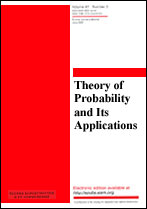|
|
Teoriya Veroyatnostei i ee Primeneniya, 1971, Volume 16, Issue 1, Pages 183–188
(Mi tvp2001)
|
 |
|
 |
This article is cited in 26 scientific papers (total in 26 papers)
Short Communications
Optimal stopped games
Yu. I. Kifer
Moscow
Abstract:
Let ($\Omega$, $\mathscr F$, $\mathbf P$) be the probability space, $\mathscr F_0\subseteq\mathscr F_1\subseteq\dots\subseteq\mathscr F_n\subseteq\dots\subseteq\mathscr F$ a nondecreasing sequence of $\sigma$-algebras. Let random variables $x_n$, $\varphi_n$ be $\mathscr F_n$-measurable ($n=0,1,\dots$).
The process may be stopped by the 1st player at the $n$th step if $\varphi_n>0$, and by the 2nd player if $\varphi_n<0$. The 2nd player gets from the 1st one the sum $x_n$ provided the process is stopped on the $n$th step. The process where the role of $\varphi_n$ plays
$$
\varphi_n^L=
\begin{cases}
\varphi_n,&\varphi_n>0,
\\
0,&\varphi_\le0,
\end{cases}
$$
is called the minorizing process and the process where the role of $\varphi_n$ plays
$$
\varphi_n^M=
\begin{cases}
0,&\varphi_\ge0,
\\
\varphi_n,&\varphi_n<0,
\end{cases}
$$
is called the majorizing process. We suppose that $\mathbf M(\sup\limits_n|x_n|)<\infty$.
We prove that if there exists an optimal policy in the minorizing (majorizing) process, starting at the $n$th step, then the policy
\begin{gather*}
\sigma^k=\inf\{t\colon t\ge k,\quad\varphi_t>0,\quad x_t\le w_t\}\quad(\tau^k=\inf\{t\colon t\ge k,\quad\varphi_t<0,\quad x_t\ge w_t\})
\\
(k=0,\dots,n)
\end{gather*}
is optimal for the first (second) player in the initial game starting at the $k$th step. (Here $w_t$ is the value of the initial game starting at the $t$th step. The existence of $w_t$ is proved in [1].)
Received: 25.09.1968
Citation:
Yu. I. Kifer, “Optimal stopped games”, Teor. Veroyatnost. i Primenen., 16:1 (1971), 183–188; Theory Probab. Appl., 16:1 (1971), 185–189
Linking options:
https://www.mathnet.ru/eng/tvp2001 https://www.mathnet.ru/eng/tvp/v16/i1/p183
|


|




 Contact us:
Contact us: Terms of Use
Terms of Use
 Registration to the website
Registration to the website Logotypes
Logotypes








 Citation in format
Citation in format 
